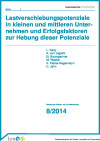Suchergebnisse
Entwicklung eines Zentralen Visualisierungsgeräts für den Energie- und Ressourcenverbrauch in Haushalten "ZENVIS"
Im Zuge des Forschungsprojekts ZENVIS soll der Nutzen eines zentralen Visualisierungsgerätes untersucht werden, das die Ablesung von Energie- und Ressourcenverbrauch (Strom, Gas, Wasser, Heizenergie und Brennstoffverbrauch) gesammelt auf einer visuellen Oberfläche ermöglicht. Das Gerät soll in Haushalten Anwendung finden und EndverbraucherInnen die Möglichkeit geben, die Energieverbräuche bewusst wahrzunehmen und zu beeinflussen.
Konzeption innovativer Geschäftsmodelle zur aktiven Netzintegration dezentraler Verbraucher- und Erzeugeranlagen
Konzeption ökonomisch und technisch sinnvoller Geschäftsmodelle für Netzbetreiber, Erzeuger sowie Endverbraucher, die potenzielle Chancen haben, langfristig bis 2050 im aktiven Verteilnetzbetrieb in Österreich zum Einsatz zu kommen.
Development of an innovative service system to increase the efficiency of public street lighting in municipalities.
The aim is to develope a innovative street lighting service system in order to increase energy efficiency: quick-checks.energy monitoring.best-practise-catalogue.benchmarking.excursions.information.training.info-point.attendant process.congress.preparation efficient street lighting model region
Direct Supply with Cold, Heat, Electricity and further Added Values Using Renewable Fuel for Stationary Fuel Cells
Fuel cells can use local resources and provide regional energy support if optimized. BIO-VISION leads to a demo-project.
BIO-VISION - Nahversorgung mit Kälte, Wärme, Strom und anderen Leistungen unter Nutzung von stationären Brennstoffzellensystemen
Brennstoffzellen können regional verfügbare Rohstoffe verwerten und bei optimiertem Einsatz eine lokale Energieversorgung leisten. BIO-VISION führt zu einem Demo-Projekt.
Conception of innovative business models for active integration into network of decentraliced units for consumers and producers
Conception of economically and technically reasonable business models for network operators, producers as well as end users who have the chance to come into operation in active distribution networks until 2050.
Lastverschiebungspotenziale in kleinen und mittleren Unternehmen und Erfolgsfaktoren zur Hebung dieser Potenziale

Schriftenreihe
8/2014
L. Karg, A. von Jagwitz, et al.
Herausgeber: BMVIT
Deutsch, 210 Seiten
Downloads zur Publikation
Production and upgrading of fermentation gas at the location Wals-Siezenheim to be feed into the natural gas distribution network
Production and multistage purification process of approx. 150 m³/ h biogas in Wals-Siezenheim. Prove the feasibility of trouble-free feeding of biogas into the natural gas grid of the Salzburg AG within an operation period of 3 years.
InnoGOK – Untersuchung der energetisch und ökologisch verwertbaren Nutzbarkeit der solaren Einstrahlung auf urbane Plätze und Wege
Untersuchung von befestigten und unbefestigten horizontalen Flächen im städtischen Raum für die Energienutzung womit ein nicht unwesentliches Potential zur Ressourcenschonung und Energieeffizienz im städtischen Kontext besteht. Zudem verspricht die Wärmeabfuhr großer solar erwärmter Oberflächen der Bildung urbaner Hitzeinseln vorzubeugen.
The Use of wind energy in skiing regions - Evaluation of the consume of electricity and dissemination of the results of the analysis
Main goals of the project are the analysis of the location Salzstiegl concerning the coverage of their own electricity needs with an already existent windmill as well as a following dissemination of the outcome of the analysis in form of a workshop for all ski lift carriers of Austria.
Energy Performance Contracting - Instrumente und Maßnahmen zur beschleunigten Marktentwicklung (IEA DSM Implementing Agreement - Task X)
Ziel dieses Tasks im Rahmen des DSM Programms der Internationalen Energieagentur (IEA) ist die Analyse und die Erarbeitung von Instrumenten zur beschleunigten Marktentwicklung von Performance Contracting und ähnlichen Energiedienstleistungen. Realisierte Beispiele zeigen, dass die typischen Einsparungen bei 20-40% - manchmal auch darüber - liegen. Werden die Maßnahmen mit Energieträgerumstellungen oder dem Einsatz erneuerbarer Energieträger kombiniert, so liegen die erzielbaren CO2-Reduktionen noch beträchtlich darüber.
SIMULTAN - Simultaneous planning environment for buildings in resilient, highly energy efficient and resource-efficient districts
This project enabled the opportunity for an essential energy efficiency increase within overlapping buildings, to achieve the objective of resilient cities and districts with respect to a high quality of life, resource sustainability and energy efficiency. The goal was a workable tool based on a multidisciplinary planning approach, to support the decision finding process in order to design both refurbishment projects and new developments within a highly efficient city.
SynENERGY - Energy optimised settlement development by making use of synergies of energy efficiency, spatial planning and building culture
SynENERGY aims at an innovative, holistic approach to urban district optimization. The project targets a comprehensive analysis of the framework and urban development concept which includes not only optimisation of sustainable energy supply and use but also increased material flows (construction and disposal) at urban district level.
Multifunktionales Energiezentrum Kötschach-Mauthen - Modellsystem zur Erreichung der Energieautarkie
Entwicklung von Konzepten für ein multifunktionales Energiezentrum (Biomasseheizwerke und Biogas-Polygeneration zur Bereitstellung von Wärme, Strom, industrieller Prozesswärme, Kälte und Treibstoff) und für einen Öko-Energietourismus für die Marktgemeinde Kötschach-Mauthen auf dem Weg zur Energieautarkie.
Reduktion fossiler Energieverbräuche durch Prozessoptimierung mit Hilfe der Simulationsbetrachtung
Musterbeispiel eines Polygenerationszentrums auf Basis Holz.
AR-HES-B – Energy storage, production and recovery of valuable substances in wastewater treatment plants
AR-HES-B develops technologically based concepts of municipal wastewater treatment plants in order to convert them from energy consumers into a hybrid energy provider, energy storage and a provider of resources. The concept enables wastewater plants to turn into an important platform in the regional energy and mass transfer.
Szenarien der gesamtwirtschaftlichen Marktchancen verschiedener Technologielinien im Energiebereich
Ökonomische Analysen und Szenarien zur künftigen Bedeutung verschiedener nachhaltiger Energietechnologielinien unter Berücksichtigung von Technologie-Interaktionen, Lerneffekten und exogenen Einflussgrößen. Ableitung von Empfehlungen zur Ausrichtung von Forschung und Technologieentwicklung.
Weiterentwicklung der landwirtschaftlichen Biogaserzeugung in Vorarlberg mit Einspeisung ins Gasnetz
Weiterentwicklung der landw. Biogasproduktion in Vorarlberg für die Gaseinspeisung; Erhebung der Substratverfügbarkeit; Produktionssteigerung und Clusterbildung durch ergänzende Neuanlagen; technische Rohplanung, wirtschaftliche Machbarkeit und Einpassung in die Rahmenbedingungen.
Transfer of technology and know-how for the initiation of fermentation gas net feed-in pilot projects.
Target group communication of the technical possibilities of fermentation gas net feed-in. Information preparation and reduction in planning complexity. Support and networking of potential future plant operators. Establishing a service office as contact point.
Organisation und Initiierung einer multifunktionalen Energiezentrale in der Gemeinde Deutschlandsberg
Konzipierung und Umsetzung einer multifunktionalen Energiezentrale am Beispiel "Modellsystem Güssing", in dem die verschiedenen Möglichkeiten auf der Erzeuger- und Verbraucherseite optimal aufeinander abgestimmt werden, um mittelfristig das Ziel einer energieautarken Gemeinde Deutschlandsberg zu erreichen.
